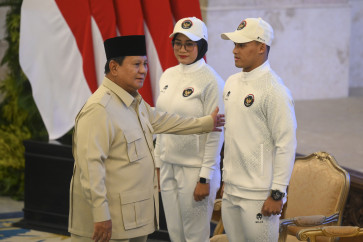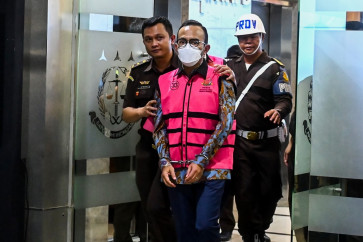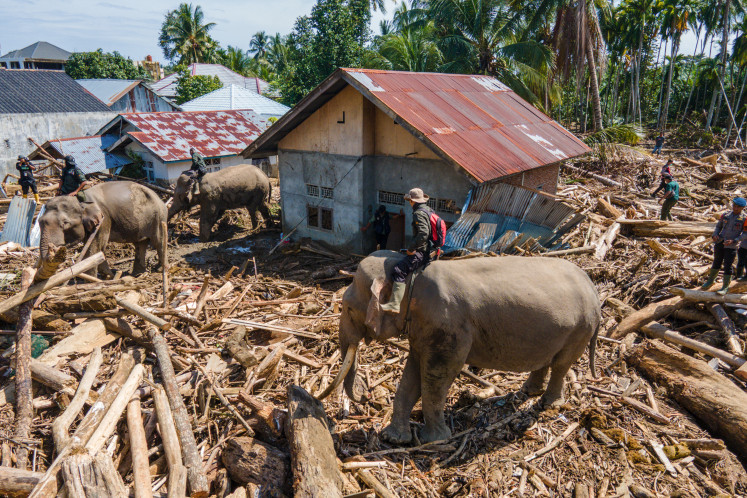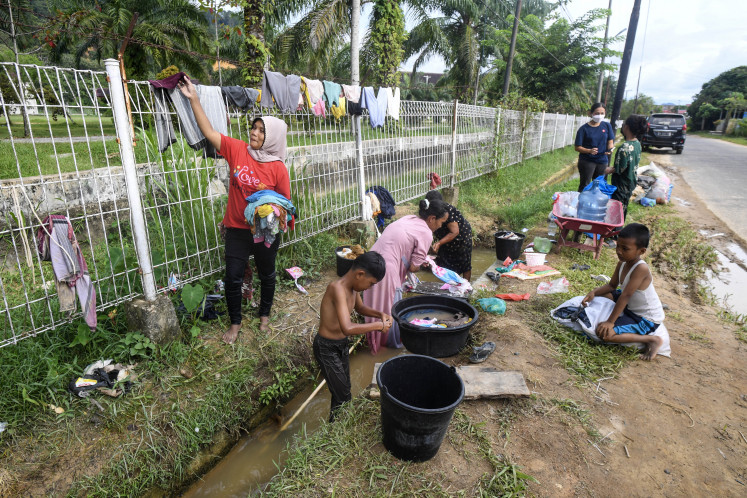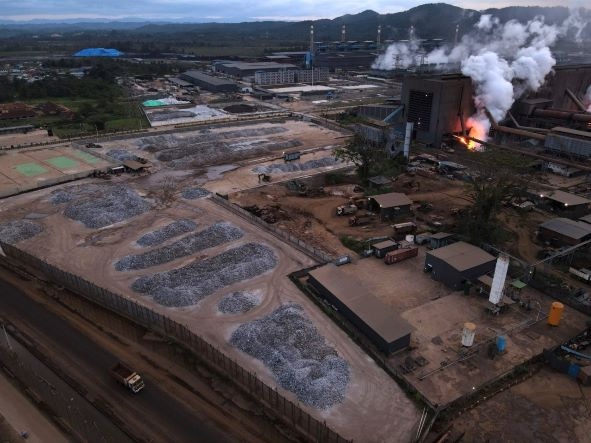Popular Reads
Top Results
Can't find what you're looking for?
View all search resultsPopular Reads
Top Results
Can't find what you're looking for?
View all search resultsJokowi draws ire for decree on human rights abuses
Justice will not be served by nonjudicial scheme, critics say.
Change text size
Gift Premium Articles
to Anyone
P
resident Joko “Jokowi” Widodo’s plan to settle past serious human rights violations through nonjudicial means has elicited a backlash from civil society groups and victims’ families, who fear it would only result in continued impunity for the perpetrators.
In his annual State Address on Tuesday, Jokowi announced that he had signed a decree on the formation of a nonjudicial settlement team for past gross human rights violations and that preparations were underway for deliberations on the Truth and Reconciliation Commission (KKR) bill in the legislature.
He also insisted that human rights findings from the National Commission on Human Rights (Komnas HAM) “continue to be followed up on”.
“The government is continuing to pay serious attention to the settlement of past gross human rights violations,” Jokowi said before an audience of lawmakers and government officials.
Following up on these remarks, Coordinating Political, Legal and Security Affairs Minister Mahfud MD told media outlet Detik on Thursday that he would serve on the nonjudicial human rights team as an advisor and that veteran diplomat and human rights activist Makarim Wibisono would lead it.
Makarim did not confirm his appointment to the role, and the presidential decree had not been made publicly available as of Thursday.
Mahfud insisted that both judicial and nonjudicial settlements would continue to run in parallel.
Mere rhetoric?
Philips J. Vermonte, dean of the School of Political Science at the Indonesian International Islamic University (UIII), said he remained unconvinced that nonjudicial settlements of human rights violations were the right solution.
"Nonjudicial settlements are needed, but whether or not [the proposed form] will reinforce the impunity of the perpetrators remains to be seen,” he said at a streamed event hosted by The Jakarta Post on Tuesday.
The Setara Institute, a human rights watchdog, also criticized Jokowi’s move, dismissing it as mere “political rhetoric”, with chairman Hendardi saying the team’s formation would only serve to entrench impunity rather than bring justice for the victims and their families.
“This presidential decree must be rejected and must be legally and politically scrutinized. Jokowi has buried the aspirations and hopes of victims to be free from […] injustice,” he said in a statement.
Hendardi added that the decision ran contrary to the 2000 Human Rights Courts Law, which stipulates that the settlement of human rights violations that occurred prior to the law be tried in an ad hoc human rights court.
A coalition of civil society groups and families of victims of gross human rights violations demanded that the House of Representatives propose the formation of an ad hoc rights court and that Jokowi revoke the decree establishing the nonjudicial team.
The coalition also called on the President to order the Attorney General’s Office (AGO) to follow up on an investigation into past human rights cases by Komnas HAM in a “transparent and accountable” manner and said the government and the House should provide room for meaningful public participation in deliberations on the KKR bill, pursuant to a 2006 Constitutional Court mandate to involve the victims and their families in such processes.
The coalition includes the Commission for Missing Persons and Victims of Violence (Kontras) and Amnesty International Indonesia, among others, and is represented by Maria Catarina Sumarsih, the mother of slain student Bernardus Realino Norma Irawan, and Suciwati, the widow of slain human rights activist Munir Said Thalib.
Tense past
Authorities have offered a wide range of excuses for their failure to resolve past rights cases, from dismissing the severity of certain incidents to raising issues of the burden of proof for incidents that transpired decades ago. Previous efforts to offer solutions have also foundered.
Nonetheless, Komnas HAM has identified 13 cases of past gross human rights violations and has submitted a dossier to the AGO to follow up on. The cases include the anticommunist purges of 1965-66, the mysterious killings of alleged criminals in the 1980s, the 1989 Talangsari massacre in Lampung, the 1998-99 Semanggi tragedies in Jakarta, the 2001 Wasior and 2003 Wamena incidents in Papua and the 2014 Paniai incident in Papua.
Of the cases, only the 2014 Paniai incident has been taken up by the AGO, with only one person being named a suspect. The Supreme Court has appointed eight ad hoc judges for the case’s first human rights trial, which will be held in Makassar, South Sulawesi, this month.
Siti Ruhaini Dzuhayatin, lead expert staffer at the Executive Office of the President, said in a press statement on Wednesday that the President had a strong desire to relieve Indonesia of past burdens that had “sapped all the nation’s energy and held it hostage”.
“By resolving serious violations of the past, Indonesia will be able to look to its future with confidence, dignity and optimism to realize a nation that is tough, independent and competitive at the global level,” she said, as quoted by Kompas.
Ruhaini also insisted that judicial means of settlement were still being pursued, as evinced by the upcoming Paniai trial.
She added that nonjudicial means put particular emphasis on uncovering truth and offering recompense and guarantees for the future, and that this would be the object of the nonjudicial team’s work.
House lawmaker Taufik Basari, who is a member of Commission III overseeing legal affairs, said legislators had voiced support for expediting the deliberation of the KKR bill.
"We must wait for the Law and Human Rights Ministry’s bid to resolve past rights violations, whether that will bring justice to and uphold the rights of the victims," he said.



